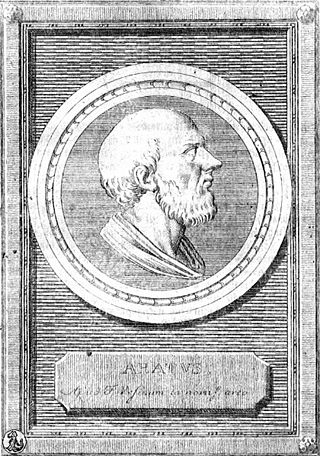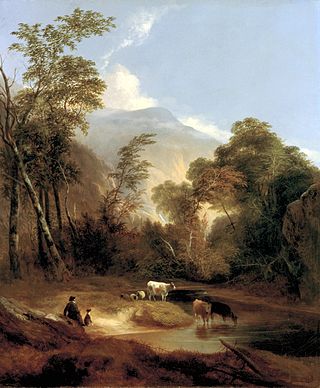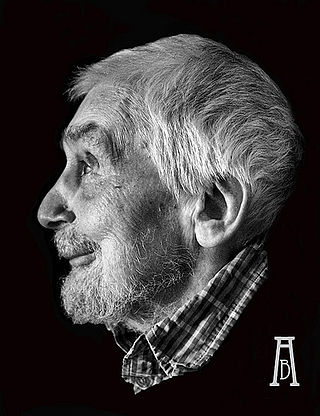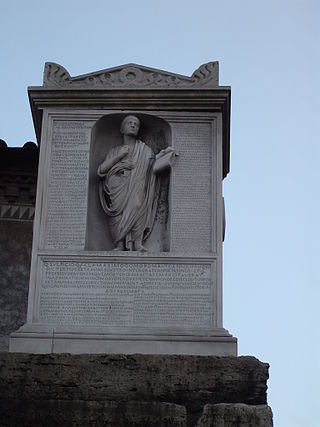Related Research Articles

Publius Vergilius Maro, usually called Virgil or Vergil in English, was an ancient Roman poet of the Augustan period. He composed three of the most famous poems in Latin literature: the Eclogues, the Georgics, and the epic Aeneid. A number of minor poems, collected in the Appendix Vergiliana, were attributed to him in ancient times, but modern scholars consider his authorship of these poems to be dubious.

Aratus was a Greek didactic poet. His major extant work is his hexameter poem Phenomena, the first half of which is a verse setting of a lost work of the same name by Eudoxus of Cnidus. It describes the constellations and other celestial phenomena. The second half is called the Diosemeia, and is chiefly about weather lore. Although Aratus was somewhat ignorant of Greek astronomy, his poem was very popular in the Greek and Roman world, as is proven by the large number of commentaries and Latin translations, some of which survive.

Theocritus was a Greek poet from Sicily, Magna Graecia, and the creator of Ancient Greek pastoral poetry.

Jacopo Sannazaro was an Italian poet, humanist, member and head of the Accademia Pontaniana from Naples.

The pastoral genre of literature, art, or music depicts an idealised form of the shepherd's lifestyle – herding livestock around open areas of land according to the seasons and the changing availability of water and pasture. The target audience is typically an urban one. A pastoral is a work of this genre. A piece of music in the genre is usually referred to as a pastorale.

Jacques Delille was a French poet who came to national prominence with his translation of Virgil’s Georgics and made an international reputation with his didactic poem on gardening. He barely survived the slaughter of the French Revolution and lived for some years outside France, including three years in England. The poems on abstract themes that he published after his return were less well received.

Edwin George Morgan was a Scottish poet and translator associated with the Scottish Renaissance. He is widely recognised as one of the foremost Scottish poets of the 20th century. In 1999, Morgan was made the first Glasgow Poet Laureate. In 2004, he was named as the first Makar or National Poet for Scotland.
Alfred Charles Tomlinson, CBE was an English poet, translator, academic, and illustrator. He was born in Penkhull, and grew up in Basford, Stoke-on-Trent, Staffordshire.
An idyll is a short poem, descriptive of rustic life, written in the style of Theocritus's short pastoral poems, the Idylls (Εἰδύλλια).

Thomas Creech was an English translator of classical works, and headmaster of Sherborne School. Creech translated Lucretius into verse in 1682, for which he received a Fellowship at Oxford. He also produced English versions of Manilius, Horace, Theocritus, and other classics.

The Georgics is a poem by Latin poet Virgil, likely published in 29 BCE. As the name suggests the subject of the poem is agriculture; but far from being an example of peaceful rural poetry, it is a work characterized by tensions in both theme and purpose.

The history of Latin poetry can be understood as the adaptation of Greek models. The verse comedies of Plautus, the earliest surviving examples of Latin literature, are estimated to have been composed around 205-184 BC.

The Eclogues, also called the Bucolics, is the first of the three major works of the Latin poet Virgil.
Robert Calverl(e)y Trevelyan was an English poet and translator, of a traditionalist sort, and a follower of the lapidary style of Logan Pearsall Smith.
Christopher Middleton was a British poet and translator, especially of German literature.

Leslie Allan Murray was an Australian poet, anthologist, and critic. His career spanned over 40 years and he published nearly 30 volumes of poetry as well as two verse novels and collections of his prose writings.

Elaine Feinstein FRSL was an English poet, novelist, short-story writer, playwright, biographer and translator. She joined the Council of the Royal Society of Literature in 2007.

The Fountain of Arethusa is a natural spring on the island of Ortygia in the historical centre of the city of Syracuse in Sicily. According to Greek mythology, this freshwater fountain is the place where the nymph Arethusa, the patron figure of ancient Syracuse, returned to earth's surface after escaping from her undersea home in Arcadia.
Idyll XI, otherwise known as Bucolic poem 11, was written by Theocritus in dactylic hexameter. Its main character, the Cyclops Polyphemus, has appeared in other works of literature such as Homer's Odyssey, and Theocritus' Idyll VI.
Marco Publio Fontana (1548-1609) was an Italian humanist and poet, fellow townsman and friend of Torquato Tasso. He wrote the Apotheosis of Tasso, a poem which extended his reputation through all Italy. His most popular work is Delphinis, a Latin poem (1582).
References
- ↑ Current RSL Fellows. The Royal Society of Literature. Archived 2012-10-02 at the Wayback Machine
- 1 2 3 Carcanet profile
- 1 2 3 Staudt, Kathleen Henderson. "Robert Wells." Poets of Great Britain and Ireland Since 1960. Ed. Vincent B. Sherry. Detroit: Gale Research, 1985. Dictionary of Literary Biography Vol. 40. Literature Resource Center. Web. 10 Jan. 2014. Gale Document Number: GALE|H1200003830
- 1 2 3 4 "Robert Wells." Contemporary Poets. Gale, 2001. Biography in Context. Web. 2 Jan. 2014. Gale Document Number: GALE|K1660001532
- 1 2 3 4 "Robert Wells." Contemporary Authors Online. Detroit: Gale, 2006. Biography in Context. Web. 2 Jan. 2014. Gale Document Number: GALE|H1000104806
- ↑ Tom Payne. What Hesiod and Virgil can teach us.Times Literary Supplement. January 10, 2014
- ↑ "Collected Poems and Translations by Robert Wells | Book review". The Guardian . 2009-10-16. Archived from the original on 2016-03-04.